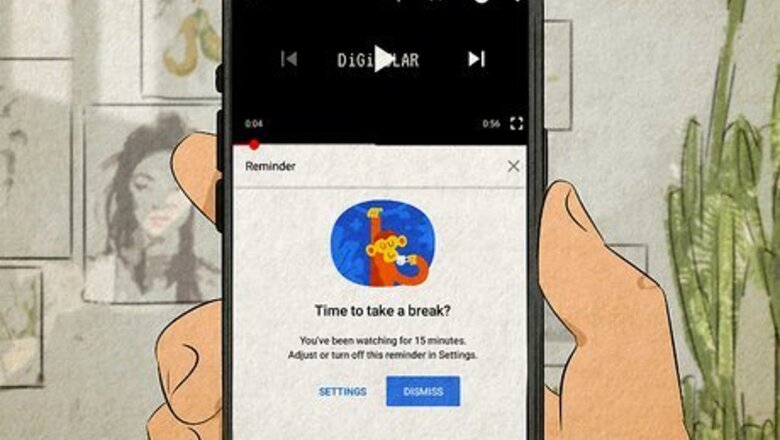
views
- Recognize the problem. If you realize you're neglecting other aspects of your life and health, it may be time for a change.
- Cut ties with YouTube by blocking it or using consistent break reminders. Limit your overall computer time to curb instant gratification.
- Start new hobbies, such as arts and crafts, painting, music, or a sport to fill your time with productive habits.
Cutting Ties
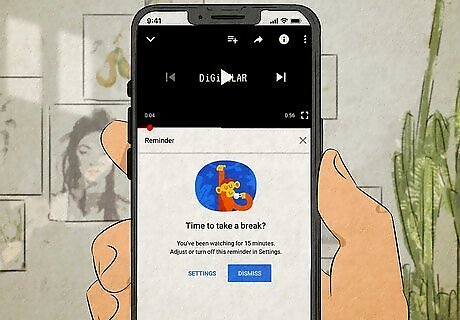
Use YouTube's Take a Break feature. If you don't want to stop watching YouTube right away, you can ease into the habit of stopping by using YouTube's Take a Break feature. This feature will give you gentle reminders to take breaks from the screen. This can help you avoid chronic eye strain, especially if you use your computer for school or work.
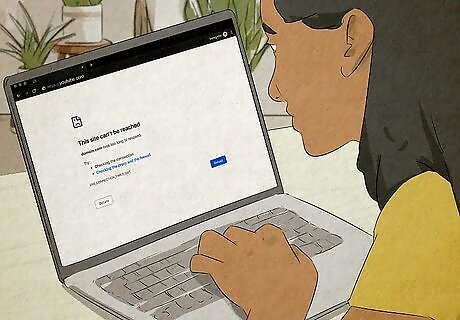
Block YouTube on your computer. If you want to make a clean break, have a friend or parent set a block password on your computer so that you won’t be able to access YouTube.
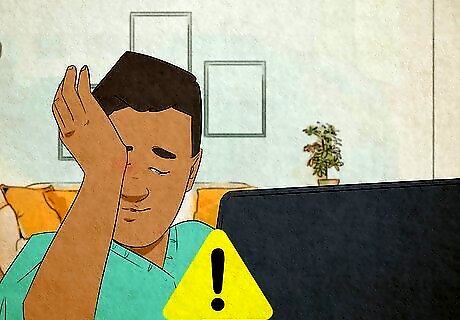
Limit your overall computer time. Put a strict personal limit on how much time you spend with your eyes on a screen. It’s generally considered unhealthy to spend more than four hours a day in front of a computer. Excessive computer use can lead to various issues, such as: Musculoskeletal problems. Headache. Repetitive stress injuries. Vision problems. Give yourself permission to let others know that you're limiting your screen time, too! For example, if a friend invites you to join an online community, such as Discord, let them know that you're trying to spend less time on your screen.
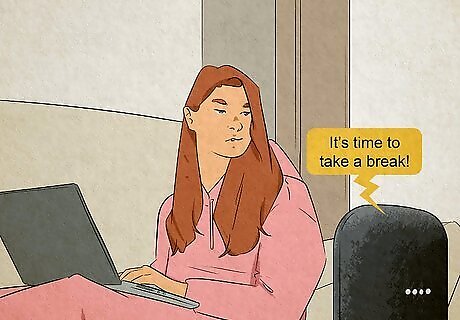
Take control of your computer time. If your addiction is in the early stages, you may be able to gradually lessen your need by managing your computer time. If you have a smart home device (like Alexa), program it so it reminds you when it's time to go screen-free.
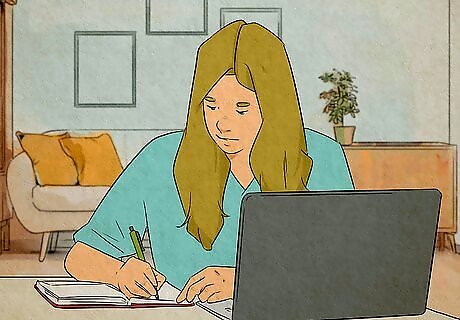
Get computer work done first. Within your allotted computer time, make sure you take care of business before going on to YouTube videos. One of the benefits of breaking your addiction is that you will be in control of your time—rather than your addiction being in control of you. Get time management software or a productivity app. There are programs available that can track your time spent on different applications, so you can have an accurate idea of what you’re spending the most time doing (or not doing). A great example would be the Forest app, which plants digital trees by setting a timer. To keep the tree alive, you must stay in the app for the specified time. Use an “internet nanny” service, such as Net Nanny or K9 web protection. These are parental control programs that can set blocks on certain websites, or control the amount of time certain applications are available each day.
Redirecting Yourself
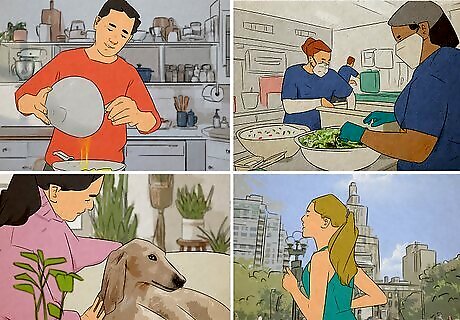
Redirect your need for gratification. Addiction happens when you start to need a particular stimulant to feel good or fulfilled. Explore other, more positive and healthy alternatives to achieve the gratification you seek.
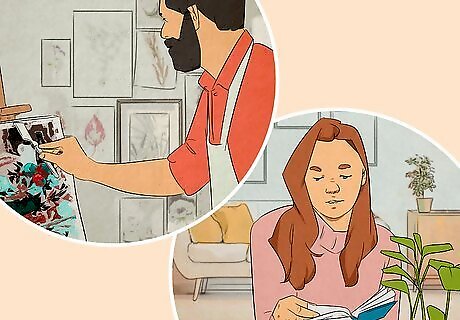
Find a different hobby. Starting a new hobby can help take your mind off YouTube. Arts and crafts. You’ll find that making stuff—such as paper mâché sculptures or origami—will not only help relieve the need for video gratification, but will make you feel much more fulfilled. Painting or drawing. You can create a sense of real fulfillment by engaging in creative arts, while simultaneously removing yourself from the situation that may be causing your video addiction. Reading. Read a paperback book or listen to an audiobook. Start a book club with your friends. There are ways to enjoy reading, even if you've never considered yourself an avid book reader.
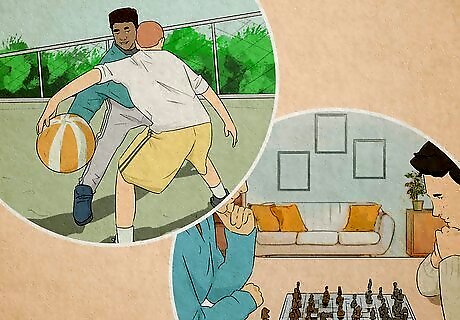
Play a sport. Getting outside and getting physical is a great alternative to engaging in addictive behaviors. Not only will your physical health improve, but getting involved in a team sport can be beneficial for your social, mental, and emotional well-being. If you don’t have friends interested in playing, you can always just show up at a local park with a basketball and shoot some hoops. Find a local intramural league for your sport of choice. Locate a local establishment for some shuffleboard, chess, checkers, or even “cornhole” if you’re not into the more physical sports.
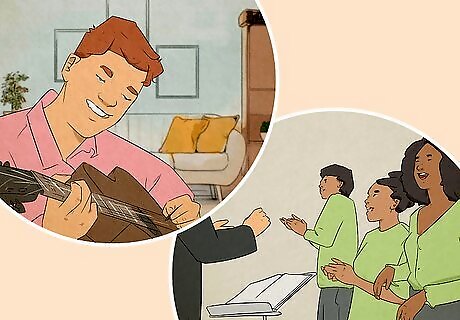
Play music. Musical creativity is another great alternative that can have benefits aside from helping with your addiction. Get friends interested in playing music with you. This is another way to benefit your social life while eliminating your addictive behavior. Playing music not only can help you treat your addiction directly, but also has benefits such as refining your time management and organizational skills. If you used to play an instrument, dust it off and start practicing again. Take music lessons. Do you want to sing or play better? There are countless professionals ready and willing to help you meet your goal. Rather than watching YouTube videos, tape yourself playing or singing and post videos of your creativity.
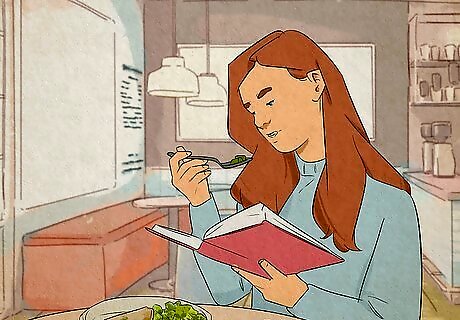
Establish internet-free zones. When you’re addicted to something on the web, such as YouTube, it’s a good idea to implement areas in your daily life that are completely free from the internet, or even better, all tech. When you go to lunch at work, take a magazine or book to the cafe instead of your tablet; even if you're planning to read a book on that Kindle Fire, it’s way too easy to start browsing the videos as well.
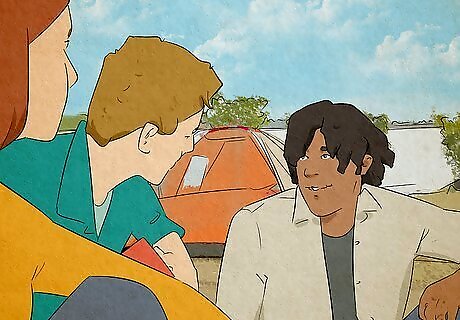
Go on a tech vacation. There are actually camps where you can go with the sole purpose of freeing yourself from the need for the internet, networking, and social media. Getting out and having a week or even a day or two with absolutely no access can be great for breaking the cycle. Getting completely away from the ability to feed your addiction can help you control your use, rather than having to live completely tech-free.
Recognizing the Problem
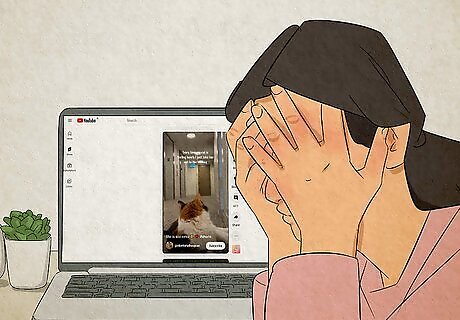
Accept that you have an addiction. Just like with any addiction, the first step is recognizing you have a problem. YouTube attracts millions of viewers, and it can be easy to start spending much more time than you ever intended watching videos. Recognizing the early signs of addiction in yourself is crucial to treating the problem.
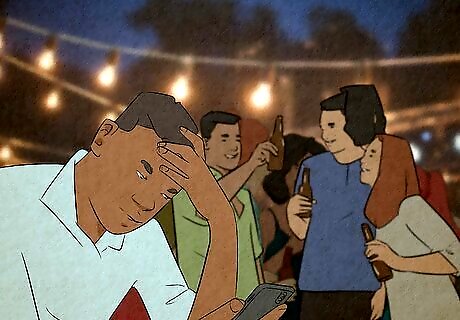
Recognize alienation. Are you pushing away friends or family, those who care about you? When someone is addicted, be it to drugs, alcohol, video games, or even YouTube videos, one of the first behaviors they tend to exhibit is only wanting to be around those who enable their addictive behavior.
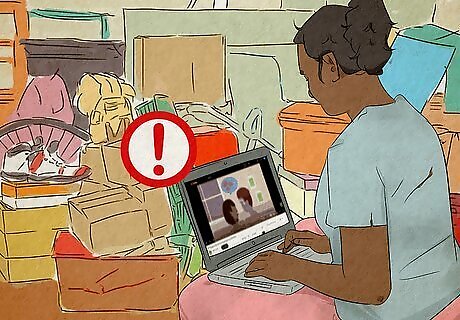
Examine your health. Addiction, even if it has nothing to do with substances, often causes one’s health to suffer. Has your bodily hygiene gotten worse? Have you begun to neglect your hair, nails, and teeth? Look at your eating habits. Behavioral addiction can lead to less awareness of the sustenance you are putting into your body. Do you have sudden mood changes? Irritability, especially when you are unable to engage in your addiction, depression, and anger can be signs that you have a problem.
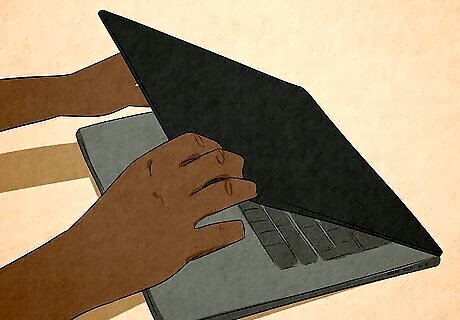
Be aware of excuses. Another sign that there is a problem is a tendency to make excuses or rationalize why it’s OK to continue with your addictive behavior. Non-addicts will see a negative behavior and want to eliminate it. If you have an addiction, you may find yourself rationalizing why it’s not a problem, which can mean that it is.
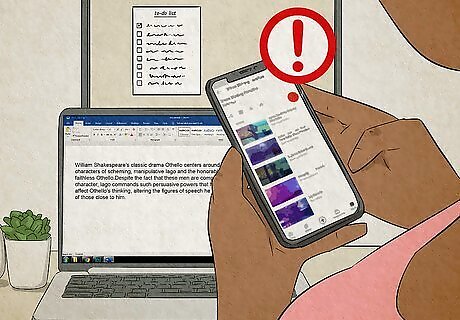
Realize when there are consequences in your life. If you’ve begun to reach the middle or late stages of YouTube addiction, you will begin to experience a detrimental effect on other, more positive aspects of your life. Is your work suffering? Do you ever miss work as a result of your need for video streaming? Do you spend less time engaging in other physical activities? Often an addiction will lead to a sharp decrease in time spent exercising, going to events, or other social and physical activities.

















Comments
0 comment